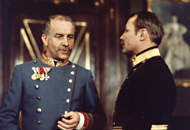I only get 250 to answer this Q??? Hummm...I'll try!
The theme that was repeated was the theme of death. There is a lot foreshaddowing in the book. I knew without a doubt that the merchant’s son was going to die in the end. In the opening of the book it tells us about his parents deaths. Then later it talks about the young girl trying to commit suicide by throwing herself out a window. It also talks about death early in the book by telling us that the olderly servant's family had almost competely died (execpt her niece who was trying to kill herself). With all the death in the beginning, coupled with the depressing feeling given, we knew that the merchant's son would die.
But why write such a unhappy book in the middle of this time when Vienna was supposed to be so pleasent? Apparently Hofmannsthal, around the time he wrote "The Tale...Night", started to "reject all that had gone before" and he thought "that the world would crumble around him" (Janik 114). I imagine Hofmannsthal reflecting himself in the merchant's son in “The Tale…Night”. Early on (before turning 25) everything was great. Then all of a sudden, he felt every one and everything watching him. Just as Hofmannstahl changed, so did the merchant's son.
I think that Hofmannsthal is asking us to ask ourselfs if possions are worth spending our entire lives loving, rather than loving others and truly getting to know people. I found it interesting that money was the cause of the merchant’s son’s death. If he didn’t think that money could bring happeniness to all, he wouldn’t have died by getting kicked by a horse while trying to pick up the money he dropped.



No comments:
Post a Comment